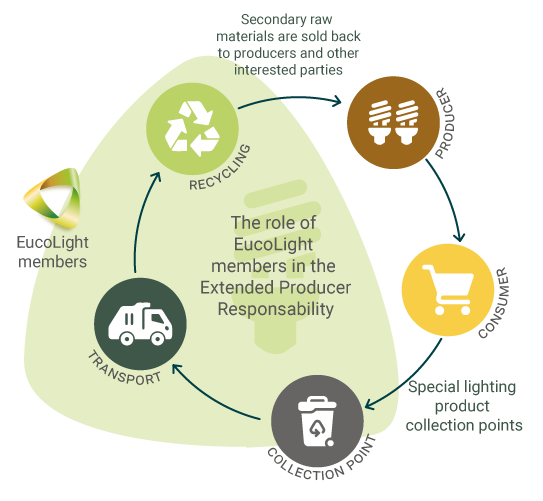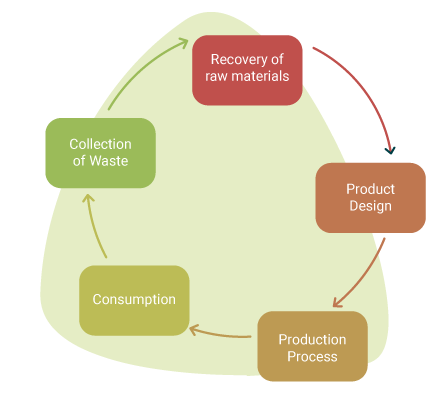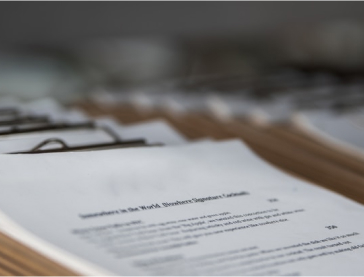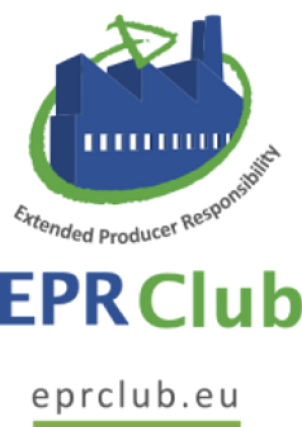By making producers responsible, an incentive effect is created to design products in innovative ways. Thereby, producers enhance the re-use of refurbished products and contribute towards a Circular Economy.
In addition, recycling and recovery of waste material will become more efficient. Ultimately, a smart product design reduces the disposal of waste and contributes to the efficient use of resources and the retrieval of valuable secondary raw materials.
EucoLight promotes the positive role of EPR schemes on society and the environment with a special focus on lighting products. The reason for this is that lighting products have unique characteristics that have to be taken into consideration in the recycling process.
Our members are experts on the collection and recycling of lighting products. Acting on behalf of producers, EucoLight and its members ensure a smooth functioning of EPR schemes for the lighting sector in Europe.

In 2002 the European legislator adopted the first WEEE Directive, which aims at assuring the collection, recycling and treatment of WEEE.
In 2012, the EU adopted the recast WEEE 2 Directive. As an EPR Directive, it extends the responsibility of producers and distributors of Electrical and Electronic Equipment (EEE), including lighting products, to the end-of-life phase.
EPR can be considered as product stewardship making producers financially or physically responsible for the collection, treatment and recycling of the products they place on the market once the consumers and end users decide to dispose them.
As the European association of lighting WEEE compliance schemes, EucoLight is committed to the principles of Circular Economy.
The European Commission adopted an ambitious package of measures in 2015, which resulted in revised legislation on waste to stimulate Europe’s transition towards a Circular Economy and in the later Circular Economy Action Plan, and more recently in 2022, the Sustainable Product Initiative.
The trigger for this activity is the growing awareness of the increasing demand for consumer goods and diminishing primary resources. Circular Economy represents the best and most sustainable way of securing access to raw materials needed for production processes.
Since the early 1990’s EPR has proven to be a vital tool in helping to make Circular Economy become a reality. EPR ensures that raw materials are recovered. Being responsible for the waste, producers have an incentive to develop product designs that consider aspects such as recyclability. The European Commission acknowledged the importance of EPR by including several related provisions and requirements in the Circular Economy Package.
EucoLight members are experts in the collection and recycling of lighting products. Acting on behalf of producers, EucoLight and its members ensure a smooth functioning of EPR schemes for the lighting sector in Europe.
EucoLight welcomes the initiative of the European Commission and encourages the Council and the European Parliament to strengthen the role of EPR schemes in Europe.


Our view is made of five key requirements which are to be included in the final Circular Economy package:
Having minimum requirements for EPR schemes is essential to ensure that all producers contribute their fair share to the end of life costs of a product. Furthermore, the implementation of EPR schemes differs significantly at Member State level threatening to reduce the overall effectiveness of EPR.
To guarantee that EPR schemes fulfill their tasks properly it is essential that there is no conflict of interest between the decision making body of EPR organisation and a waste management operator who provides services to the EPR organisation. This avoids consequences in terms of distortion in the waste market.
The financial contribution paid by producers should be made publicly available to enhance transparency.
Good EPR policies do not only acknowledge the pivotal role of producers but also the role of other actors involved in the waste chain. After all, retailers, municipalities and especially consumers have important responsibilities in regards to the collection of waste. For example, if consumers do not return products to collection points, these products fall outside the sphere of influence of the producer. Consequently, all actors involved should share the financial responsibility of littering.
EPR organisations must be required to cover the whole territory of a Member State. If this is not the case this will lead to a scattered system of EPR schemes. This would run the danger of collection services not being consistently available which goes to the detriment of collection rates.
The EPR club, whose members range from producers and EPR schemes to policy makers, is an exchange platform which:
The EPR Club hosts events and debates giving EucoLight the opportunity to provide expertise on WEEE lighting while gaining insights on other waste streams and identifying points of common interest.
